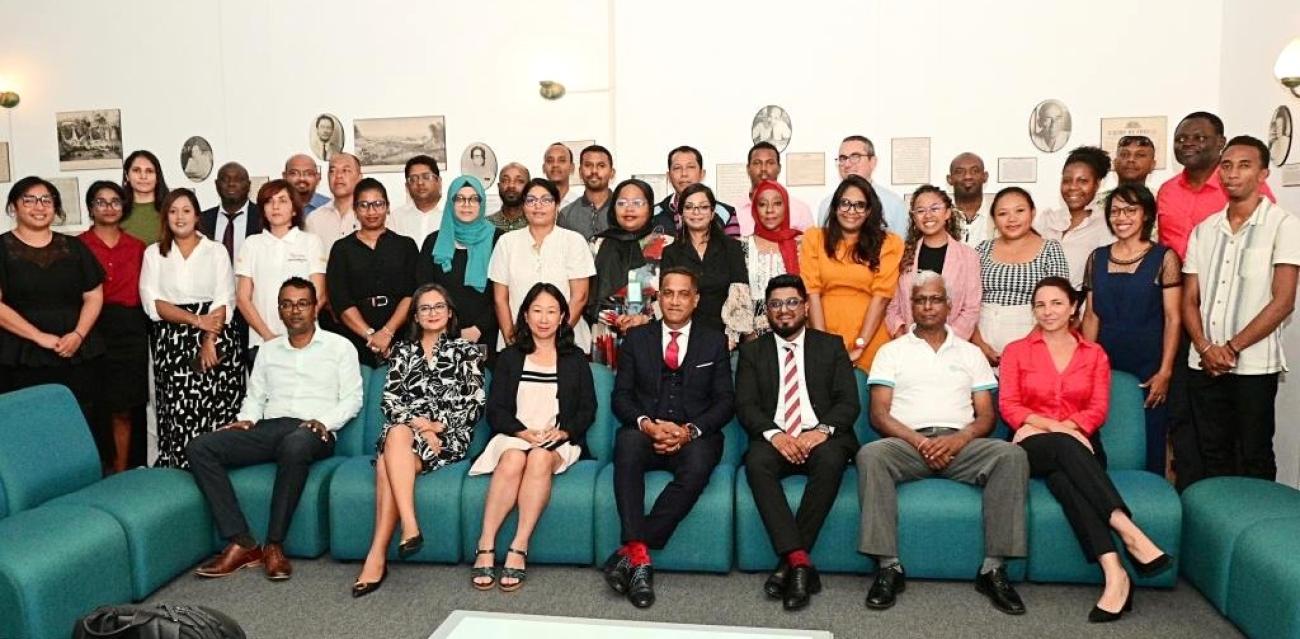Port Louis – Journalists and media professionals from Mauritius, Seychelles, and neighbouring Eastern African nations gathered in Port Louis from 13 to 15 May 2025 for a regional training workshop aimed at improving climate change reporting and addressing the growing threat of disinformation.
With Mauritius and Seychelles positioned at the frontline of climate change impacts, the workshop placed a strong focus on enhancing media literacy within Small Island Developing States (SIDS) and Least Developed Countries (LDCs). It equipped journalists with the skills needed to combat misinformation, critically analyze environmental data, and amplify credible climate narratives.
Hosted under the theme ‘Climate Change and Disinformation,’ the initiative was organized by UNESCO, in collaboration with Media Trust, Africa21, the Indian Ocean Commission, and the University of Mauritius. In addition to journalists from Mauritius, participants were welcomed from Comoros, Djibouti, Madagascar and Seychelles, reflecting the regional scope of the training.
This training aligns with the Global Initiative for Information Integrity on Climate Change, launched in November 2024 by the United Nations, UNESCO, and the Brazilian government. The initiative strengthens communication campaigns to counter climate disinformation, ensuring that SIDS media professionals can effectively report on environmental challenges and solutions.
The Growing Threat of Climate Disinformation
Climate disinformation is worsening global environmental crises, creating barriers to public awareness and policy action. Mauritius, despite its low greenhouse gas emissions, remains highly vulnerable to climate-related risks, including coastal erosion, biodiversity loss, extreme weather events, and economic disruptions.
UNESCO's Assistant Director-General for Communication and Information, Tawfik Jelassi, underscored the urgency of media integrity in climate reporting:
“Disinformation is a global threat that now rivals climate change as one of the greatest risks facing humanity. Despite overwhelming evidence of climate change, misleading narratives continue to dominate public debate, amplified by social media and AI.”
By equipping journalists in Mauritius with specialized training, the workshop reinforced the critical role of local media in safeguarding truth, educating communities, and holding policymakers accountable.
Empowering Journalists Through Targeted Training
Throughout the three-day workshop, 27 journalists participated in expert-led sessions, refining investigative reporting techniques and gaining tools to counter climate disinformation.
Key objectives of the training included:
- Understanding mechanisms of misinformation related to climate change
- Identifying, avoiding, and reporting greenwashing practices
- Strengthening citizen engagement through enhanced media literacy
- Analysing cognitive biases and manipulations in environmental data
- Examining the consequences of climate misinformation on fundamental rights
Additionally, journalists from Mauritius, Seychelles, and other participating nations will produce at least 15 investigative reports and articles based on the insights gained—ensuring continued impact beyond the workshop.
UNESCO’s Continued Commitment to Strengthening Climate Journalism
UNESCO’s Regional Adviser for Communication and Information for Africa, Misako Ito, reiterated the organization's dedication to educating journalists on best practices for reporting environmental issues:
“Integrity of information is a key global challenge in the face of social media and AI. (“UNESCO Regional Office for Eastern Africa | Nairobi - Facebook”) Raising awareness and strengthening journalism in climate reporting is vital to ensuring that accurate, science-based information reaches the public.”
The workshop supports UNESCO’s operational strategy for Small Island Developing States (2023-2029), reinforcing media capacity and strengthening public trust in climate reporting across Mauritius, Seychelles, and the broader region.
A Step Forward in the Global Fight Against Climate Misinformation
For Mauritius, the workshop represents a major step in enhancing journalistic integrity and resilience against misinformation, ensuring that local media can accurately report on environmental challenges and solutions.
With the support of UNESCO, the UN, and its partners, journalists from SIDS nations are now better equipped to counter misinformation, amplify science-driven narratives, and engage communities in informed climate action, strengthening Mauritius, Seychelles, and the broader region’s commitment to sustainable development.



